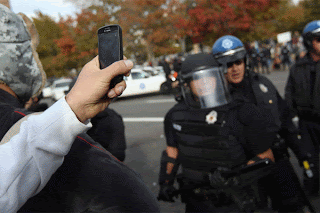Man jailed for four days for videotaping police.

A California man was jailed for four days for attempting to record police officers on a public street.
Daniel J. Saulmon was charged with resisting, delaying and obstructing an officer but the video shows he was standing well out the way of a traffic stop and was only arrested when he failed to produce identification to an approaching officer.
And there is no law in California that requires citizens to produce identification. And even if there was, it would require the officer to have a reasonable suspicion that he was committing a crime.
But prosecutors have already dropped the charge against Saulmon as well as a few other minor citations relating to his bicycle such as not have proper reflectors on the pedals.
And they most likely knew who he was considering he won a $25,000 settlement from the same police department after they unlawfully arrested him on eavesdropping/wiretapping charges in 2005.
This time, it appears the Hawthorne Police Department will be dishing out much more, thanks to officer Gabriel Lira’s abuse of authority.
“They knew exactly who I was,” Saulmon said in a telephone interview with Photography is Not a Crime Saturday, adding that he has recorded them on a regular basis since the 2005 arrest when he was jailed after attempting to file a complaint inside the police station.
“They always address me as ‘Mr. Saulmon’,” he said.
Judging by his Youtube channel, which is filled with videos of police officers from Southern California jurisdictions, his latest arrest was an obvious case of retaliation.
The arrest took place on November 8, a Thursday, close to midnight. Because it was a holiday weekend, he would have had to wait until Tuesday to see a judge. He bailed himself out on Monday with a $1,000 he did not want to spend.
It took police a week to return his camera and his bicycle, and only after his attorney sent them a letter informing them that they had no legal basis to maintain possession of his personal property.
Even though he is still facing a citation for not having a headlight on his bicycle, he says he has video evidence from when he picked it up that shows it had two working headlights.
http://www.photographyisnotacrime.com/2012/11/24/california-man-jailed-four-days-for-recording-cops/
Newspaper publisher arrested for taking a video of a police checkpoint.
Hawaii - Tommy Russo publishes the Maui Time weekly newspaper in Maui, Hawaii, and he has a history of police encounters due to his independent style of journalism.
This week he was arrested for the second time in the past year, this time for recording a police checkpoint which was set up to collect revenue from people who had minor code violations with their vehicle or registration.
The video of the altercation shows Russo pulling up the checkpoint, stepping out of his car and walking up to a police officer who ordered him back to his car, but didn’t say anything about the filming.
Next he came across a second cop who was extremely hostile with him and eventually arrested him when he asserted his rights.
Police charged Russo with “obstructing a government operation” because they couldn’t find a legitimate charge to book him under. Even if it was a legitimate charge, according to the local law books Russo was not guilty of obstruction
It is likely that this case will never stand up in court, and the cops probably knew that when they arrested him.
The point probably wasn’t to get a charge out of the deal, but mainly to get Russo out of their way and shut him up.
Tommy Russo, the newspaper publisher assaulted by a cop last year while trying to record on the set of Dog the Bounty Hunter, was arrested this week while trying to record a police check point in Maui.
The video shows Russo pulling up the checkpoint, stepping out of his car and coming across a police officer who had Russo walk back to his car and turn on his hazards, but didn’t take too much issue with him recording the checkpoint after that.
http://www.youtube.com/watch?v=GOgaNB6ssNs&feature=player_embedded
But then Russo came across a second cop who took great issue with Russo recording the checkpoint, ordering him to move away from the area.
When Russo asserted his rights, he was arrested.
Russo, who runs the weekly Maui Time was charged with “obstructing a government operation,” but the video doesn’t show much obstructing.
At least not by the standards as it is written in the Hawaiian law books, which defines the charge as the following:
A person commits the offense of obstructing government operations if, by using or threatening to use violence, force, or physical interference or obstacle, the person intentionally obstructs, impairs, or hinders:
(a) The performance of a governmental function by a public servant acting under color of the public servant’s official authority;
(b) The enforcement of the penal law or the preservation of the peace by a law enforcement officer acting under color of the law enforcement officer’s official authority; or
(c) The operation of a radio, telephone, television, or other telecommunication system owned or operated by the State or one of its political subdivisions.
(2) This section does not apply to:
(a) The obstruction, impairment, or hindrance of the making of an arrest; or
(b) The obstruction, impairment, or hindrance of any governmental function, as provided by law, in connection with a labor dispute with the government.
Police were conducting checkpoints to look for over-sized tires and illegal tints, which ended up backing traffic up for miles, prompting Russo to investigate with his camera.
http://www.photographyisnotacrime.com/2012/11/22/maui-police-arrest-newspaper-editor-for-video-recording-traffic-checkpoint/


